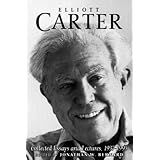
Average Reviews:

(More customer reviews)For anyone interested in modern music, by whatever name (contemporary classical composition, "new music"), this book is invaluable. Elliott Carter, in my view one of the two best composers of the late 20th century, along with Gyorgy Ligeti, has written fairly extensively over the years about his music. He was actually employed as a critic for Modern Music in the late 1930s, one source of these essays. Presented here are trenchant analyses of the difficulty of being a composer of advanced works in a commercial society, including the problems of orchestras and rehearsals ("the orchestral brontosaur"), reflections on American and European music, reminiscences of his studies with Boulanger in Paris, explanations of various compositions including the First and Second string quartets and the Concerto for Orchestra, and fascinating comments on other composers, including of course Charles Ives, along with Stravinsky, Varese, the Second Vienna School, Debussy and Mozart. Carter expresses the utmost respect for Webern's exquisite miniatures, while making clear his rejection of serialism, which he never adopted.
Elliott Carter enjoys a much higher level of recognition in Europe than in the U.S., where composers of schlocky film scores are vastly more popular (ie, "Star Wars"). While noticed by only a few today, these writings will play a part in establishing Carter's future reputation as one of the greatest composers of the 20th century -- an American composer whether he was recognized by his contemporaries at home or not.
Click Here to see more reviews about: Elliott Carter: Collected Essays and Lectures, 1937-1995
Elliott Carter (b.1908) is now generally acknowledged as America's most eminent living composer. This definitive volume of his essays and lectures-- many previously unpublished or uncollected -- shows his thinking and writing on music and associated issues developing in parallel with his career as a composer; his reputation became established in the 1950s, and the material in this book offers an important and knowledgeable commentary on the course of American and European music in the succeeding decades. Carter's articles on his own music have become classic texts for students of his oeuvre; he also writes on the state of new music in Europe and the United States and the relations between music and the other arts. Other pieces range from a consideration of aspects of music to the work of individual composers. As a whole, the collection is the expression of Carter's musical philosophy, and a valuable record for historians of modern music.
Click here for more information about Elliott Carter: Collected Essays and Lectures, 1937-1995

No comments:
Post a Comment